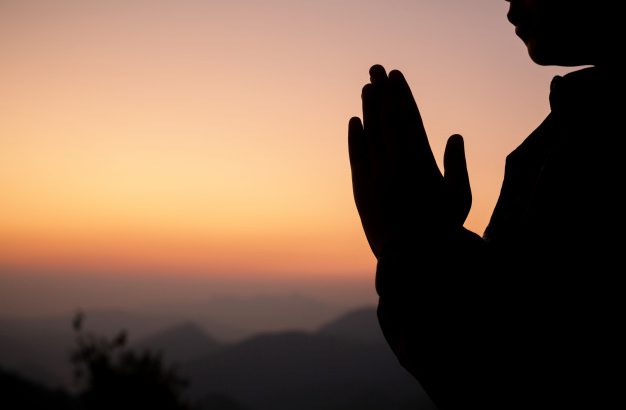The spirituality writer, Tom Stella, tells a story about three monks at prayer in their monastery chapel. The first monk imagines himself being carried up to Heaven by the angels. The second monk imagines himself already in Heaven, chanting God’s praises with the angels and saints. The third monk cannot focus on any holy thoughts but can only think about the great hamburger he had eaten just before coming to chapel. That night, when the devil was filing his report for the day, he wrote: “Today I tried to tempt three monks, but I only succeeded with two of them.”
There’s more depth to this story that initially meets the eye.
I wish that, years ago, I had grasped how both angels and great hamburgers play a role in our spiritual journey. You see, for too many years, I identified the spiritual quest with only explicit religious thoughts, prayers, and actions. If I was in church, I was spiritual, whereas if I was enjoying a good meal with friends, I was merely human. If I was praying and could concentrate my thoughts and feelings on some holy or inspiring thing, I felt I was praying and was, for that time, spiritual and religious; whereas if I was distracted, fatigued or too sleepy to concentrate, I felt I had prayed poorly.
When I was doing explicitly religious things or making more-obvious moral decisions, I felt religious, everything else was, to my mind, mere humanism.
While I was not particularly Manichean or negative on the things of this world, nonetheless the good things of creation (of life, of family and friendship, of the human body, of sexuality, of food and drink) were never understood as spiritual, as religious. In my mind, there was a pretty sharp distinction Heaven and Earth, the holy and the profane, the divine and the human, between the spiritual and the earthly. This was especially true for the more earthy aspects of life, namely, food, drink, sex, and bodily pleasures of any kind.
At best, these were distractions from the spiritual; at worst, they were negative temptations tripping me up, obstacles to spirituality.
But, by stumbling often enough, we eventually learn: I tried to live like the first two monks, with my mind on spiritual things, but the third monk kept tripping me up, ironically not least when I was in church or at prayer.
While in church or at prayer and trying to force mind and heart onto the things of the spirit, I would forever find myself assailed by things that, supposedly, had no place in church: memories and anticipations of gatherings with friends, anxieties about relationships, anxieties about unfinished tasks, thoughts about my favourite sports teams, thoughts of wonderful meals with pasta and wine, of grilled steaks and bacon-burgers and, most pagan of all, sexual fantasies that seemed the very antithesis of all that’s spiritual.
It took some years and better spiritual guidance to learn that many of these tensions were predicated on a poor and faulty understanding of Christian spirituality and of the real dynamics of prayer.
Understanding
The first faulty understanding had to do with misunderstanding God’s intent and design in creating us. God did not design our nature in one way, that is, to be sensual and to be so rooted deeply in the things of this Earth, and then demand that we live as if we were not corporeal and as if the good things of this Earth were only sham and obstacles to salvation, as opposed to being an integral part of salvation.
Moreover, the incarnation, the mystery of God becoming corporeal, sensual, taking on human flesh, teaches unequivocally that we find salvation not by escaping the body and the things of this Earth but by entering them more deeply and correctly. Jesus affirmed the resurrection of the bodily, not the flight of the soul.
The second misunderstanding had to do with the dynamics of prayer. Initially, in its early stages, prayer is about focus and concentration on the sacred, on conversations with God, on trying to leave aside, for a time, the things of this world to enter into the realm of the sacred. But that’s the early stage of prayer.
Eventually, as prayer deepens and matures, in the words of John of the Cross, the important things begin to happen under the surface and sitting in chapel with God is not unlike sitting down with someone you sit down with regularly. If you visit someone on a daily basis you won’t each day have deep, intense conversations; mostly you will talk about everyday things, family concerns, the weather, sports, politics, the latest TV programmes, food, and so on – and you’ll find yourself looking at your watch occasionally.
It’s the same with our relationship to God. If you pray regularly, daily, you don’t have to agonise about concentrating and keeping the conversation focused on deep, spiritual things. You only have to be there, at ease with a friend. The deep things are happening under the surface.


 Fr Ronald Rolheiser
Fr Ronald Rolheiser
